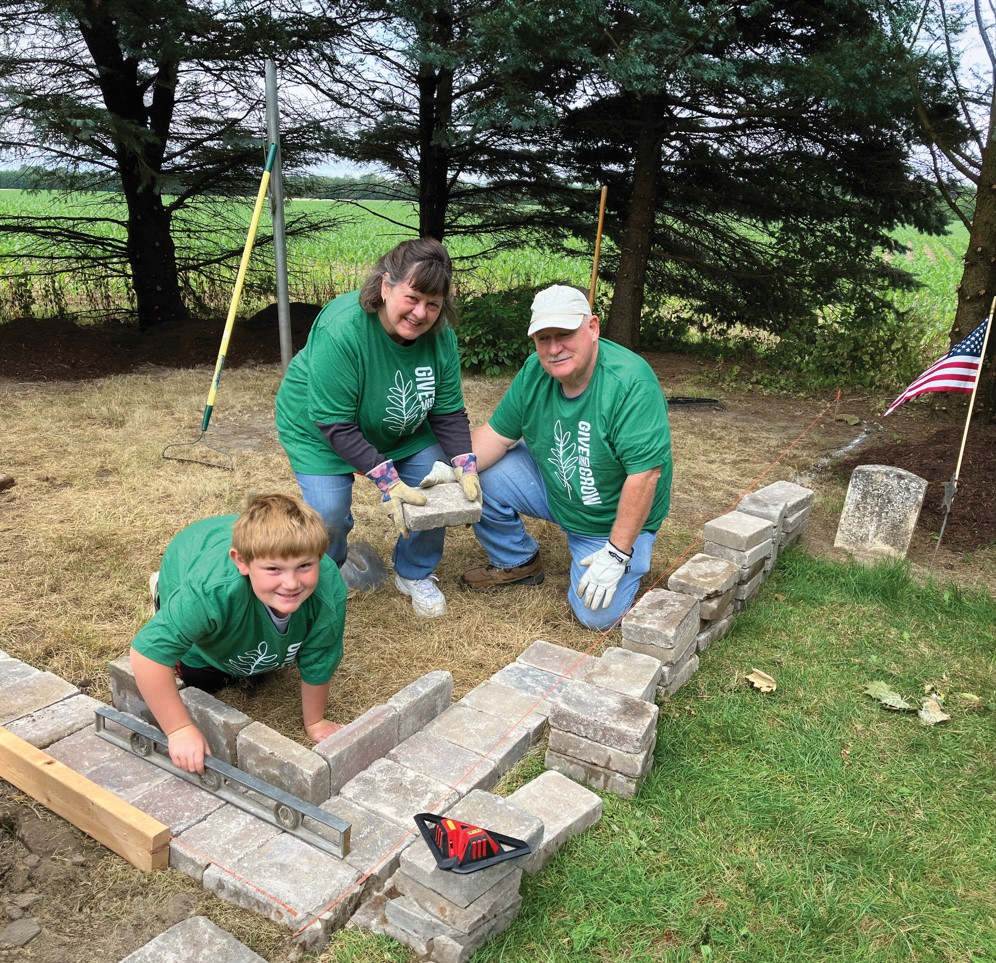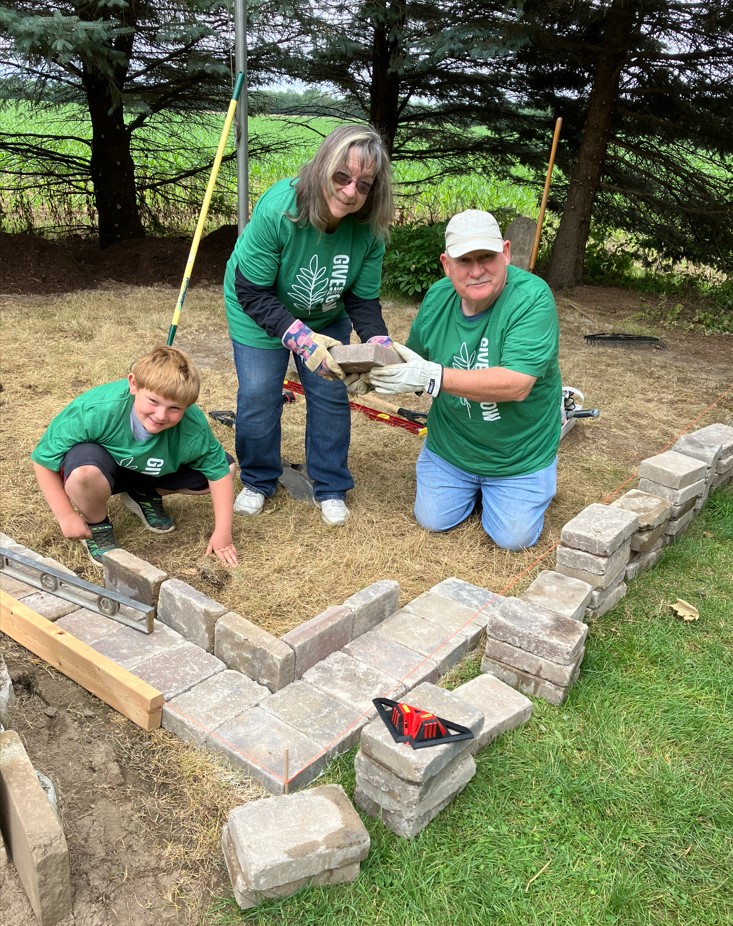
5 minute read
Gratitude for a full life
Being thankful helps us to not only feel happier, but also to live healthier, fuller lives.
Veterans Day and Thanksgiving stir up appreciation in Americans, which is good. Among other things, an attitude of gratitude helps us enjoy and share much fuller lives.
Gleaner members Phil and Lucinda Ruby of Napoleon, Ohio, recently showed their gratitude by building a “Never Forget Garden” in honor of veterans at the Gunn Cemetery in Henry County. The garden pavers and pollinator plants were purchased with a Gleaner Give and Grow grant.
Such gardens are supported nationally by the Daughters of the American Revolution (DAR) and the Society of the Honor Guard Tomb of the Unknown Soldier, two other groups that encourage expressions of gratitude.
“For me, most of my dad’s family was in the wars,” Phil Ruby said. “One of my uncles died in World War II. Another one died when he came back from Vietnam.” The Gunn Cemetery is a resting place for many residents and several veterans of different wars including Elijah Gunn Sr. from the Revolutionary War.
Lucinda Ruby’s father also fought in World War II. He returned with three Purple Heart commendations and was injured by shrapnel in his knee that prevented him from bending his leg. “I’m grateful for the country that we have, and their sacrifices,” she added. “They fought for that. You never forget they went through a lot in the war and experienced things they should never have experienced.”
Similarly, Thanksgiving is a call to action, not just a holiday or even a feeling. “Giving thanks” is like the project the Rubys worked on with their grandson and several DAR members. It is a way to experience a virtue that blesses givers as much as recipients.
Throughout 2024, Forum has explored what it means to “live a full life”:
Purpose provides the “why,” giving framework for a life that makes a difference rather than one chasing our own enjoyment.
Community (or “fraternity”) is built as we grow relationships and discover “who” we can serve and encourage.
Activity is “how” we live out our beliefs in the fleeting days allotted to us. The original Gleaner symbols of the harvest sickle and hourglass were reminders of our own mortality and brief lives.
Gratitude is “what” fills and overflows a full life. “Let gratitude be the pillow upon which you kneel to say your nightly prayer,” author Maya Angelou wrote. Gratitude is sometimes referred to as a “vanishing virtue,” elbowed aside in today’s society by entitlement and grievance. This might help explain why studies show a steady decline in Americans’ sense of happiness. The U.S. fell to No. 23 last year, and Americans younger than 30 ranked No. 62 (worse than the Dominican Republic).*
Happiness, it turns out, is not based on such things as our standard of living, our smartphone model, or even what we receive. A 2021 study compared the reactions of Olympic bronze medalists with silver medal winners.** Although silver medals are objectively superior, researchers found bronze medalists often appear to be happier. They concluded that silver medalists frequently focused on failing to win and compared themselves with the gold medalists, while bronze medalists were more thankful to have won any medal. The difference wasn’t the medal, it was gratitude.
“The more you practice the art of thankfulness,” Ohio-born clergyman Norman Vincent Peale noted, “the more you have to be thankful for.” Scientific studies confirm that expressing gratitude improves our brain chemistry and helps us focus on positive characteristics, making us more optimistic and improving our health, self-esteem and relationships.***
People are instructed throughout the Bible to give thanks, even in difficulty. David was pursued by enemies, yet thanked God for aiding him many times in the past (Psalms 105-107), for God’s loving nature (Psalm 138), for listening to him (Psalm 66), and more. Paul the apostle suffered persecution and a “thorn in the flesh,” yet told believers to give thanks in all circumstances (1 Thessalonians 5:18 and Ephesians 5:20). Gratitude doesn’t mean ignoring pain and problems, but raising concerns with prayer rather than worry. Thanksgiving becomes an act of faith in God’s promise to work “all things” for good, and looking for ways to help.

Shifting our outlook from “awful” toward “full” can also change how we respond to others. We can gratefully help, trusting that God gives to us even as we give to others. We also can set up long-term plans to protect others after we’re gone.
A similar paradox is evident in the Gunn Cemetery. Although surrounded by evidence of mortality, the Rubys find peace honoring the former residents who helped build the community. The Rubys have even started cleaning lichen and moss off headstones. “It’s amazing the detail that is coming out and the history revealed in those stones,” Lucinda Ruby said. “In this small way we can show our appreciation for our ancestors and especially veterans whose memory deserves our care and respect.”
Visit www.gleanerlife.org/giveandgrow to learn more about Gleaner Give and Grow grants and how to apply for a project that helps express your gratitude.
* www.nbcnews.com/news/world/us-no-longer-one-20-happiest-countries-re-young-probably-know-rcna144199
** https://theconversation.com/for-many-olympic-medalists-silver-stings-more-than-bronze-228655
*** https://healthcare.utah.edu/healthfeed/2021/11/practicing-gratitude-better-health-and-well-being








